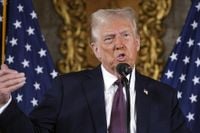The United States has officially rejected the World Health Organization's (WHO) 2024 amendments to the International Health Regulations (IHR), a legally binding framework designed to improve global preparedness and response to future pandemics. This decision, announced on Friday, July 18, 2025, marks a significant step in the Trump administration's broader effort to distance the U.S. from multilateral health governance and assert national sovereignty over public health policy.
The amendments, finalized in 2024 after years of international negotiations, introduced several key measures aimed at strengthening pandemic defenses worldwide. Among these was the creation of a new "pandemic emergency" category to clearly define and trigger responses to significant global health crises. Additionally, the reforms sought to enhance information-sharing between countries and the WHO, and to ensure equitable access to medical supplies for developing nations. For instance, a parallel pandemic pact adopted in Geneva in May 2025 requires manufacturers to allocate a target of 20% of vaccines, medicines, and tests to the WHO during pandemics, aiming to guarantee access for poorer countries.
Despite these goals, the U.S. government expressed serious reservations about the amendments. Secretary of State Marco Rubio and Secretary of Health and Human Services (HHS) Robert F. Kennedy Jr. jointly issued a statement criticizing the amendments for expanding the WHO's authority in public health emergencies and for vague and broad terminology that, in their view, risks shifting focus from rapid, effective action to political issues such as "solidarity." They argued that the amendments were developed without adequate public input and could lead to international bureaucrats shaping U.S. domestic health policies, which the administration firmly opposes.
"This administration will never cede control over American public health decisions to unelected international bureaucrats," Rubio declared, emphasizing the administration's commitment to defending American self-determination. Kennedy echoed this sentiment, warning that the amendments would grant the WHO "unprecedented power" and open the door to what he termed "global medical surveillance." He detailed concerns about centralized systems involving vaccination passports, health IDs, and a centralized medical database, which he believes could infringe on Americans' privacy and personal liberties.
In a video posted on his X account, Kennedy elaborated, "The proposed amendments to the International Health Regulations open the door to the kind of narrative management, propaganda, and censorship that we saw during the COVID pandemic." He questioned whether the U.S. would submit to a "technocratic control system that uses health risks and pandemic preparedness as a Trojan horse to curtail basic Democratic freedoms." Kennedy called for strengthening national sovereignty in health matters and keeping international organizations like the WHO in check.
The Trump administration's rejection also highlighted concerns about the potential imposition of digital health documentation systems, such as vaccine passports, which officials fear could compromise privacy rights. While the WHO does not have enforcement authority to mandate lockdowns or travel restrictions, and the amendments explicitly preserve national sovereignty, U.S. officials remain wary of any perceived encroachment on domestic policy.
This move follows the broader trajectory of the Trump administration's disengagement from the WHO. In January 2025, President Trump signed an executive order initiating the withdrawal of the U.S. from the WHO, citing dissatisfaction with the agency's handling of the COVID-19 pandemic and alleged undue influence by China. The U.S. exit, which makes it the WHO's largest former financial backer to leave, means it would not be bound by the new pandemic pact or the IHR amendments.
The COVID-19 pandemic, which began in early 2020 and claimed nearly 70 million lives worldwide, exposed significant gaps in global pandemic preparedness and coordination. The WHO's 2024 amendments and the parallel pandemic pact were crafted in response to these shortcomings, aiming to foster a more unified and equitable international response. Advocates of these reforms argue that pandemics transcend borders and require cooperative global strategies to be effectively managed.
However, the U.S. government's rejection underscores a persistent tension between global health governance and national sovereignty. Many in the U.S., particularly within conservative circles, remain skeptical of multilateral institutions, fearing loss of control over domestic affairs. The contentious political debates during the pandemic over lockdowns and vaccine mandates have further fueled concerns about international influence on American health policies.
WHO Director-General Tedros Adhanom Ghebreyesus expressed regret over the U.S. decision, warning that it could undermine coordinated global responses to future pandemics. Ghebreyesus has previously emphasized that "Health cannot be a question of income; it is a fundamental human right," a perspective that envisions equitable health care access worldwide regardless of national wealth or individual circumstances.
Despite the U.S. rejection, the IHR amendments and the pandemic pact maintain that health policy remains the prerogative of national governments. The WHO's role is to coordinate and facilitate, not to enforce. Yet, the debate highlights the delicate balance between international cooperation and national autonomy in an increasingly interconnected world facing shared health threats.
As the global community continues to grapple with the lessons of COVID-19, the U.S. stance raises questions about the future of international health collaboration. Will the world move toward more integrated pandemic preparedness, or will sovereignty concerns drive countries to chart independent paths? For now, the Trump administration has made its position clear: American public health decisions will remain firmly under American control.


